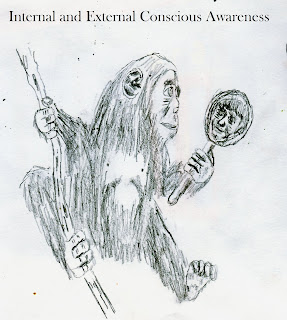People constantly seek to create higher levels of
understanding and depth of thought. One of the purposes of higher education is
to help people understand their world and encourage ways to critically think
about it. A method of doing this is to become more aware of yourself and
the world in which you live. This requires the ability to think about your
premises and understand the way you think in order to remove as many fallacies
as possible. More accurate thinking comes with higher levels of conscious awareness
and is a sign of a person’s reflective intelligence.
The ability to understand one’s environment by being able to
focus attention outward (consciousness) or inward toward oneself
(self-consciousness) creates a higher form of understanding (Mead, 1934). As
one becomes more aware of the environmental information and internal
information they contain about themselves they move up in progression of
understanding. This creates higher levels of accurate thinking that can be used
to achieve goals.
One develops such higher order thinking through their conscious
awareness of themselves within their environment. One can define it as, “A conscious experience is reflexive in that
it consists in part in awareness of itself” (Block, 2007, pp 8). It means
that one is consciously aware when they can reflect on their experiences to
gain a better understanding.
One can describe this experience as meta-cognition or
thinking about thinking. When one gets good at understanding their internal
states they begin to have authoritative self-knowledge. This self-knowledge comes
from thinking about thinking about one’s current thought as in the cognito-type
reflections (Burge, 1988). In essence, one thinks about their previous thoughts
in order to understand their current, past or future internal states.
Introspection is the handmaiden of higher order thinking. According MacDonald (2008) when one can grasp the nature of one’s
thoughts they can also grasp a chain of previous thoughts and introspect on
them. The more aware one is of the data that go into those thoughts and various
feelings that were associated with those thoughts the higher their state of
conscious self-reflection. If one has multiple levels of such experiences and
are aware of them through self-reflection they can come to more accurate
thinking by rooting out bias.
Some people can go to a point of having meta-self-awareness
which is one of the highest forms of consciousness. This meta-self-awareness
affords an opportunity to create complex understandings of oneself as well as
models of other people’s perceptions (Vogeley& Fink, 2003). This extended consciousness affords an
opportunity to understand others perceptions by reflecting on them and their
behavior. It is an ability use that model to predict behavior and make more
accurate choices in an environment full of people’s impressions.
Lau and Rosenthal (2011) argue that a high order conscious
awareness is based on stronger mental representations of internal states of
awareness. As one becomes more complex in their thinking they not only become
more aware of themselves but also the world around them. This higher order of
environmental understanding encourages survival in difficult situations. It
helps to ensure that people make appropriate decisions based upon the internal
and external information available to them and ensure accuracy of goal attainment
by accurately predicting their environment.
Tips for Developing Higher Forms of Conscious Awareness:
-Understand yourself in your environment.
-Reflect on your past and use that information to make
better choices in the future.
-Develop your emotional intelligence and understand where
your feelings come from.
-Challenge your assumptions.
-Think about why you think something is true or not true.
-Realize the limitations of others and their perspectives.
Block, N. (2007). Consciousness, accessibility and the mesh
between psychology and neuroscience.Behavior
and Brain Sciences, 30.
Burge, T. (1988).Individualism and self-knowledge.Journal of Philosophy, 85.
Lau, H. & Rosenthal, D. (2011).Empirical support for
higher-order theories of conscious awareness.Trends in Cognitive Sciences, 15 (8).
MacDonald, C. (2008). Consciousness, self-consciousness, and
authoritative self-knowledge.Proceedings
of the Aristotelian Society, cviii (3).
Vogeley, K & Fink, G. (2003). Neural correlates for
first person perspective. Trends in
Cognitive Sciences, 7 (1).

No comments:
Post a Comment